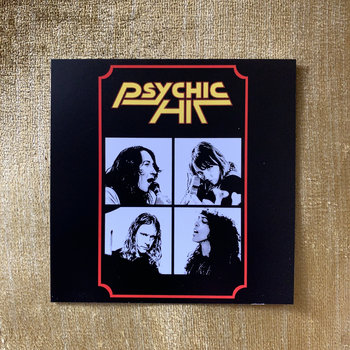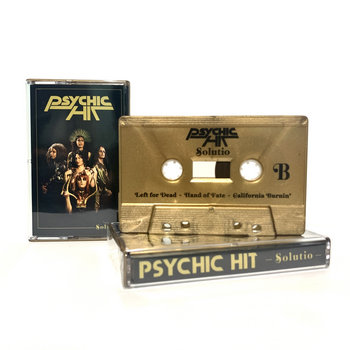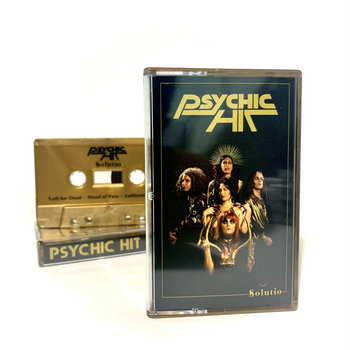
Perhaps what you notice first when listening to the various musical projects of guitarist and songwriter Andrea Genevieve is how spacious and considered the music is, despite remaining heavy, intense, and loud. While her bands Purple Rhinestone Eagle, Queen Crescent, and Psychic Hit all deal in hard-hitting, heavy-riffing sounds, you will also hear flutes, you’ll be advised to “follow the path of the black mare,” and you’ll encounter musical influences sourced from all over the world, where various forms of rock ‘n’ roll have been enlisted as a form of protest music.
Genevieve has been playing guitar for 26 years. Growing up primarily in Buffalo, New York, she began going to basement shows and playing in bands as soon as she was old enough to do so. Though her own work has moved in a very different direction, it was bands like Heavens to Betsy, Team Dresch, Sleater-Kinney, and Bikini Kill that first encouraged her to pick up a guitar. “I’m forever indebted to those folks,” Genevieve says. “Through bands, traveling, and activism, I started meeting folks from all over the country and the world. At a certain point, I wanted to make a bigger move. My friend, the artist Cristy C. Road, and a few other folks encouraged me to move to Philly, which is where they were all living at the time.” Genevieve moved into a house where she started jamming with her future bassist Morgan Ray Denning, picked up drummer Ashley Spungin somewhere along the way, and Purple Rhinestone Eagle was born.
“I liked Philly, but at the time, it was feeling like a drag. That’s when another friend, Adee Roberson of New Bloods, told us that we should move to Portland. And we did.” Genevieve recalls this era in Portland as a “special time in terms of the bands, art, and creativity that was happening” and feels truly proud to have been a part of it. However, she estimates there were probably about fifteen to twenty queer BIPOC musicians in a sea of otherwise total racial homogeny. “And most of us lived together!” Genevieve exclaims. “We lived together partially out of fun, but partially out of necessity because we needed the support. Since then, most of us have moved away to cities like Oakland, L.A., and NYC, where we can feel more like ourselves. All that being said, those were incredibly formative years for my songwriting development, and the friendships I had then were special and transformative.”


Purple Rhinestone Eagle started out unintentionally creating scrappier punk songs and moved towards heavier sounds over time, which was a kind of return for Genevieve, whose first musical exposure was via her older cousin who loved metal. Following the dissolution of that project, she moved to San Francisco. While she didn’t intend to jump into another band right away, her drumming DJ friend Amy Martinez really wanted to jam with her. “We shared a love of bands like Los Dug Dug’s and Flower Travellin’ Band, so we thought it would be fun to do something that sounded like that.” Queen Crescent flew on this wind: four women of color from different ethnic backgrounds making international, proggy psych rock influenced predominantly by music that arose from countercultural movements in places like Indonesia, Japan, Turkey, West Africa, and Mexico.
Although Purple Rhinestone Eagle and Queen Crescent were two distinct bands, in Genevieve’s mind, there was a sonic sisterhood between the two. “As much as I deeply appreciated those projects, I had a desire to close that chapter of my life. It happens, you know?” she says. “By then, I was living in Oakland and enjoying the resurgence of rock ‘n’ roll and old-school heavy metal that was happening in the scene. So many awesome bands! Even though this was just back in 2018, it was an inspiring time for me. I reconnected with some of my favorite old albums and started writing music that would eventually end up on Psychic Hit’s first demo.” After she conceived the band with singer Ariana Jade and recruited their former bassist Melanie Burkett and their drummer, Justin Divver, “everything magically fell into place after that,” Genevieve says.
Existing at the confluence of many intersecting oppressions, Genevieve’s confidence making socially progressive and anti-oppressive heavy music has grown as she has worked to change the narrative of her life and expand her happiness and self-love. “When I was younger, I was far more concerned with how people perceived my music and it occasionally bummed me out that I felt like such an outlier in a multiplicity of spaces,” Genevieve admits. “If you read the lyrics of The Great Return, you can kind of gather how utterly depressed I was at that time of my life.” But what makes Genevieve really stand out from the crowd as an artist is the fact that she has never compromised herself just to fit in. And it seems like that work is paying off—Genevieve is thrilled to witness that “as the years have gone by, heavy genres are becoming increasingly femme, queer, and BIPOC. It’s good to see the hard work that many of us have been putting in for years start to pay off for younger generations.”
Genevieve is also insistent about not allowing her ancestors in heavy music to be erased. Despite the fact that white supremacists utilize all kinds of music to spread their messages, it is heavy music that’s most commonly associated. “But racism is not exclusive to any one genre,” she points out. “Take Morrissey, for example. Here is a guy who has been praised by queers and womxn for his feyness and lyrical wit for decades, but any time you see him in the news now, he is making these increasingly xenophobic, inflammatory statements. If we’re going to call people out, we need to call everyone out. Genre doesn’t matter.”
She continues: “We must be careful not to paint any scene or genre with broad strokes, because it erases the important contributions of good people as much as it gives way too much power to shock rock assholes. When I want to draw inspiration from my scene, I think of people like Phil Lynott (Thin Lizzy) and I listen to bands like Sound Barrier. I don’t care what racist, spiritually devoid, sad-sack prejudiced musicians have to say. I don’t support them. I don’t buy their music. I don’t go to their shows. They are clowns and they need therapy.”
Genevieve listens to all kinds of music, from all over the world, and from different time periods. In addition to the fact that her ears enjoy the novelty of new sounds, immersing herself in the perspective of non-European songwriters is an important part of her personal healing, and listening to music exclusively from one genre or sub-genre creates boring and predictable songwriting—something she wants to avoid. But when it comes to metal, she listens to a lot of ’70s heavy metal, traditional metal, and NWOBHM (New Wave of British Heavy Metal). Her all-time favorite band is Judas Priest, and Rob Halford is a personal hero of hers. “To come out as a gay man fronting one of the biggest metal bands of all time was incredibly courageous and badass. I’d love to meet him,” she says. In terms of “pure chops,” though, her biggest inspirations are Ritchie Blackmore (Deep Purple) and Uli Jon Roth (Scorpions). But in terms of sheer power and presence, Odetta will always be at the top of her list. And while Tina Turner is not a guitarist, Genevieve insists that “her whole essence gives [her] life.”
Genevieve’s current band Psychic Hit had only just been getting off the ground when the pandemic hit. “We’ve had a couple of line-up changes, but this incarnation of the band is so damn excellent. It’s one of the things that gets me up in the morning. Justin is a mind-blowing drummer and Zack [Gillam] is an ultra-talented bassist. The new material, which we are demo-ing right now is like nothing musically I’ve ever done before. I think people will be shocked and delighted by the new direction. During the pandemic, we’ve been hunkering down and working on new songs. The new music is so effin’ catchy. It’s definitely going to signify a new era for the band once it’s released. Even non-metal people will love it,” Genevieve insists, laughing. “It sounds tough as nails, but deeply tender. Nostalgic, but new. The type of sweet melancholy you want to immediately headbang to. Watch out for it.”
Here are some key releases from Genevieve’s bands.
Purple Rhinestone Eagle
Amorum Tali
Though Purple Rhinestone Eagle existed for many years, they only put out some demos to sell locally at shows and on tour while they were in Philadelphia. Recording new material was also delayed by the transition to living in Portland, but once they settled in, they really got cracking, releasing both a 7-inch split with Northern Swords and Forsorcerers and their debut EP Amorum Tali in 2009. “In Portland, we actually had the time, space, and energy to start to harness our future sound,” Genevieve says. “This was our first proper release as a band: just three kids trying to make something cool and fun, and I think we accomplished that.”
On songs like “Meadow” and “Sleep Golden Sleep,” the lyricism is reminiscent of Mary Timony, but songs like “Tidal Wave” contain strong punk energy and stick out from the rest, sounding more like something Slant 6 might have created. In fact, Christina Billotte’s later project Quix*o*tic’s take on Sabbath’s “Lord of This World” is a powerful antecedent for the potent brew of Sabbath, stoner rock, and magical, witchy things which constitutes the aesthetic of Purple Rhinestone Eagle. “Walk With the Wizard” is an invitation to “daughters of shredders that came before [them],” the first inkling of an ongoing thread in Genevieve’s ouevre around guitar ancestors and being the continuation of an important cultural lineage and tradition. For her, this continuation expands what is possible within music as a living organism through deep engagement and exploration.
Purple Rhinestone Eagle
The Great Return
While Genevieve acknowledges that this record was forged out of depression, it’s also full of anger, love, and perseverance. On “The Queen of Rain and Gray,” a battle with seasonal depression in a town where it feels nothing is happening ends on a victorious note when winter is survived, the sun returns, and people become less isolated. In “Burn It Down,” the band deliver a litany of things they seek to destroy: “patria, borders, saviors, and calendars; monoliths, empire, ideals, inflated egos; hierarchy, shitty art, hipster scenes, vapid bullshit” being only a few. “Thirteen Cycles” utilizes the space and time of many instrumental musical cycles to communicate the process of staying committed to your own truth and power while waiting for the world to change.
The band had been working on “some far out esoteric shit,” re-writing a score from a Kenneth Anger film for an event—Genevieve believes it was for the film Lucifer Rising. The day before the event, Anger’s people called the venue and threatened to sue. “It was kind of hilarious,” Genevieve says. “We ended up using a lot of that material for The Great Return.” Making it was a great effort for the band, who recorded to tape and spent a lot of time crafting these songs. Genevieve says the process of its creation is kind of a blur now, but she’s grateful it remains an old friend of longtime listeners and continues to find new ears in which to resonate.
Queen Crescent
Queen Crescent


Perhaps the most important thing to know about Queen Crescent is communicated directly in their song “Ancestors”: “Queen Crescent’s taking back the last 500 years.” They also open the album with the repeated question “Are you ready for the Queen of the Crescent Moon?” In the opinion of this writer, it’s likely very few are prepared for such an ecstatic event. As a fuzzy, flutey, and wildly mystical international proto-metal psych band founded by queer femmes of color with a shared love of Los Dug Dug’s and liberation, Queen Crescent are probably anticipated by none, but recommended for all.
This record also marks the first time Genevieve worked with Tim Green of the D.C. basement studio the Embassy and California’s Louder Studios, who also recorded many underground music projects on Vern Rumsey of Unwound’s half-inch 8-track recorder at the legendary Red House in Olympia, Washington.
Dre Genevieve
Strangely Free


Genevieve met Karissa Talanian of Eye Vybe Records when Talanian was on tour. Discovering Talanian was friendly with her bandmate and partner, Ariana Jade, from when Jade was on tour with Nik Turner’s Hawkwind, Genevieve thought that the material Talanian was releasing vibed well with the solo material she was developing. “As much as I am a rocker, I also have a side of me that likes to write folky, synthy music too,” Genevieve explains. Since she has a ton of songs that wouldn’t make sense for any band she has been in, Genevieve wanted to record a few of those as a fun project. Describing these recordings as “wizard folk with synth sprinklings,” the tape is dedicated to those lost in the Ghost Ship warehouse fire, which Genevieve recalls as “one of the most horrible days in recent memory. It was actually my birthday and I woke up to the news that the fire happened. At that point in my life, I wasn’t as directly involved in the DIY scene as I had been, but I still had many ties to those scenes. Pretty much all of my friends lost someone that day. It took years for the community to recover from that.”
Genevieve played most of the instruments on this album and found it super fun to have total control in the studio. “I love being in bands, but there was something very freeing about calling all the shots exclusively,” she admits. She’s planning to record more solo material in this vein once Psychic Hit takes a break after promoting their next release and is really looking forward to it.
Psychic Hit
Promo 2018








Compact Disc (CD), Cassette, Vinyl




Psychic Hit emerged from Genevieve’s desire to be in a band throwing down more of a “powerhouse rock vibe.” It is her and singer Ariana Jade’s brainchild. “I had left Queen Crescent and she was done touring and performing with Nik Turner’s Hawkwind. We were listening to a lot of Judas Priest and Scorpions, particularly the album In Trance, and one day she was like, ‘We should really start a band,’” Genevieve says. Genevieve had long desired to work with a singer with her vocal range; Jade also possesses incredible stage presence and composes thoughtful lyrics. It was a great opportunity for Genevieve to step away from vocal duties to pursue exclusively being a lead guitarist.
When she is writing songs for Psychic Hit, Genevieve draws a lot of inspiration from “old-school metal but also rock bands, like Heart, Blue Öyster Cult, and Thin Lizzy. I also love Turkish psych-prog, Tuareg guitar music, and weird synth stuff like Mort Garson. That pops through, too, I think.” The making of this album was an incredibly fun process and bonding experience for Genevieve: “This was the moment I got excited to be in a band again. Justin, our drummer, was the sound engineer. Just having the four of us bandmates in the room without any outside person felt so intimate. I loved it.”
Psychic Hit
Solutio






Vinyl LP, Cassette




When asked to define the sounds of all of her bands, Genevieve described Psychic Hit as “pure leather, hard rock, and pink roses—especially the new stuff we are working on.” Though this new project remains heavy and psychedelic, it’s definitely a harder rock and heavy metal sound pulling more of its influence from bands like Judas Priest, Scorpions, and Iron Maiden. But in keeping with the thematic trajectory of Genevieve’s previous outfits, opener “Livin’ On” champions channeling the ancestors and staying alive to move forward the spirit of resistance. Following that, they hit us with “Constellation,” a queer love song. The album concludes with the scorching “California Burnin’,” which takes on profiteering around the California wildfires as well as the ongoing gentrification in the Bay Area. While this new band represents a new direction for her, these songs remain a clear part of the same cloth Genevieve has been weaving sonically for a long time now.
“We recorded this album without bass because our bassist was going through some big personal things then, so we had to track bass later,” Genevieve says. “I think this EP was our experiment with playing with different directions we could go in. An important step in our creative process.”







